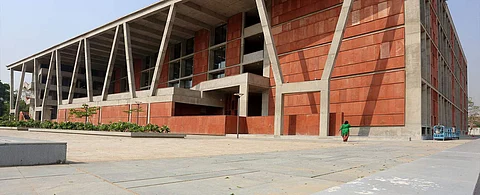

What if you can study all about cybersecurity, crime investigation and more in just three weeks? That's exactly what these Independent Study Period courses are all about. These 'beyond the classroom' courses are conducted by Ahmedabad University over a period of three weeks in an eight-hour a day format. Rather than following the regular curricular period format, these courses are offered to enable concentrated learning through block courses, studio-inspired experiential courses, perspective sharing, skill building, field courses and innovative experiments in learning. The university came up with this initiative in 2016 and showcased some of the courses last December.
We spoke to Dr Bibek Banerjee, Senior Dean, Strategic Initiatives and Planning, Ahmedabad University after the event to find out all about these interesting courses that are rooted in disciplines like Literature, Sociology, Design, Science, Technology and more. Excerpts...
What is the Independent Study Period? How is it different from the regular courses offered at colleges?
The Independent Study Period or ISP at the university is a block term conducted every year in December. It offers a chance to students to explore their interests and to do so in a real-life environment that takes them out of the classroom to diverse settings, from a simulated crime scene to the bazaars of Ahmedabad or even the habitat environments of Kutch. Students often have diverse passions but have no means to explore them, especially when those passions are not related to their academic specialisation. ISP uses these interests as a starting point to craft learning experiences that are interdisciplinary and build conceptual understanding in an experiential way while collaborating with peers in a project-based environment. Spanning three weeks, with over 60 unique courses that range from Design Thinking to The Art of Science, the ISP courses serve as a crucial tool for students to experiment with new ideas and new ways of learning.
Are there specific criteria for students to be a part of the courses?
All students, irrespective of their discipline, who are in their first year of an Undergraduate Programme at Ahmedabad University can participate in ISP. Students opt for a single studio course depending on their interest. One interesting point is that courses do not require prior experience or knowledge of the area, not even for a course like Science of Musical Instruments. In fact, many students in the course have never touched a musical instrument before or understand the intricacies of music. They, however, learn the physics of sound through this process.
We are specifically interested in this course - Clues - The Truth-Finder: Solving the Crime. How does it work?
Crime investigation is a crucial step in solving the mystery behind a crime. In this investigative process, clues play a role as a ‘truth-finder’ and students get to understand the significance of different kinds of clues found at the crime scene. Students get the opportunity to learn aspects involved in Forensic Sciences while they detect and identify clues (fingerprint, foot/shoeprint, forged documents, counterfeit currency, blood pattern analysis to name some) which are usually found at the crime scene and establish its link with the crime scene, suspect or victim. A crime scene is reconstructed, and the students are required to solve the crime. Students particularly enhance their skills in deductive thinking and understanding of physical concepts and human behaviour.
Crime investigation is something that is taught to students mainly from the field of forensic sciences. What methods will this course teach?
The idea of such a course is to bring interdisciplinary learning, multiple skills, and application of theory to bear on the education of undergraduates. In this case, students learn to detect and identify different types of clues which are usually found at the crime scene and establish their link with the crime, suspect or victim.
Also, tell me more about The Science of Musical Instruments course?
This is a hands-on course where knowledge is generated by constructing a musical instrument in the workshop. Students work in groups with complementary skills. Each group spends most of the course constructing and studying two or more instruments including chordophones, idiophones, membranophones, and aerophones. Students design and construct their own musical instruments. They also attempt to understand the functioning of the human singing voice through various (often weird) experiments.
Pertaining to the Science of Musical Instruments course, what kinds of experiments are performed to understand the functioning of the human singing voice?
To understand the singing voice, we use Spectral analyser apps on our smartphones and experiment with our voices. We make all sorts of sounds and try to understand why we get such varied tone colors, based on the harmonic content of the sounds that the analyser shows us. The course brings human physiology, sound and acoustics, and engineering together to provide a rich learning platform that builds a deep understanding of any phenomenon. These courses are open to all. You can imagine the sense of achievement and joy in a biology student who builds a geodesic dome or a commerce student who learns physics by building a musical instrument.
How would an eight-hour day format for three weeks help students? Aren't such courses usually longer in duration?
ISP is done in a studio, laboratory or travel format. Since it is hands-on, students need to immerse themselves in these sessions and concepts. The 8-hour format works very well as students learn the practical methods rather than through lectures. Students have so much fun during this process that they don’t want these courses to end.
